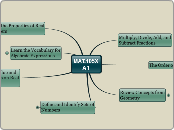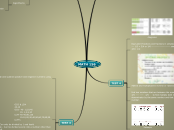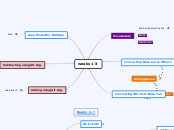MAT.105X
A1
Define and Identify Sets of Numbers
Real Numbers
All rational and irrational numbers taken together.
Any number you can find on a number line.
Irrational Numbers
Numbers that cannot be written as a ratio of two integers.
Includes all nonrepeating, nonterminating decimals
Rational Numbers
Any number of the form p/q, where p and q are integers and q is not zero
Includes all terminating decimals and all nonterminating repeating decimals
Integers
{ . . . , -3, -2, -1, 0, 1, 2, 3, . . . }
Whole Numbers
{ 0, 1, 2, 3, . . . }
Natural Numbers
{ 1, 2, 3, . . . }
Define Absolute Value and Perform Operations on Real Numbers
When subtracting two real numbers:
convert the problem to addition and then follow those rulesRemember, to convert a subtraction problem to addition, you add the opposite of the value between subtracted
When adding two real numbers:
if both numbers are positive, add them to get a positive answerif both numbers are negative, add their absolute values and then make the result negativeif one number is negative and one number is positive, take the difference between their absolute values and apply the sign of the number with the larger absolute valueWhen dividing two real numbers:
if both numbers are positive, the answer is positiveif both numbers are negative, the answer is positiveif one number is negative and one number is positive, the answer is negativeRemember:
if the numerator is zero, the answer is zeroif the denominator is zero, the answer is undefinedboth results have no signWhen multiplying two real numbers:
if both numbers are positive, the answer is positiveif both numbers are negative, the answer is positiveif one number is negative and one number is positive, the answer is negativeWhen multiplying more than two real numbers:
if there are an even number of negative factors, the answer is positiveif there are an odd number of negative factors, the answer is negativeAbsolute Value
The absolute value of a number is the distance between that number and 0 on the number line
The absolute value of a number is always positive or zero (nonnegative).
Learn the Vocabulary for Algebraic Expressions
Evaluate
Substituting values for the variables in an algebraic expression and simplifying using the order of operations.
Coefficient
Each term has a coefficient, or numeric part.
Term
A term is a numbers or a variable or a product or quotient of numbers and variables.
Algebraic Expression
An algebraic expression is a collection of numbers, variables, and grouping symbols connected by operations symbols.
Learn the Properties of Real Numbers
Distributive Properties
Multiplication over addition: a(b+c) = ab + ac
Multiplication over subtraction: a(b-c) = ab - ac
Inverse Properties
Addition: a+(-a) = 0
Multiplication: a(1/a) = 1 [a not zero]
Identity Properties
Addition: a+0 = a
Multiplication: 1a = a
Associative Properties
Addition: a+(b+c) = (a+b)+c
Multiplication: a(bc) = (ab)c
Commutative Properties
Addition: a+b = b+a
Multiplication: ab = ba
Review Concepts from Geometry
Circle
The locus (or set) of all points in a plane a given distance (radius) from a given point in the plane (the center of the circle)
Circumference & Area
Circumference: 2 x pi x radius, or pi x diameter
Area: pi x radius squared
Trapezoid
Quadrilateral with one pair of opposite sides parallel
Perimeter: The sum of the length of all four sides
Area: average length of the bases x height
Parallelogram
Quadrilateral with opposite sides parallel
Perimeter: The sum of the length of all four sides
Area: base x height
Triangle
Three sided enclosed figure
Perimeter: The sum of the length of all three sides
Area: 0.5 x base x height
Rectangle / Square
Rectangle: Parallelogram with four right angles
Square: Rectangle with all sides equal
Perimeter & Area
Perimeter: The sum of the length of all four sides
Area: Base x height
Angles
Supplementary
Two angles that add to 180 degrees
Complementary
Two angles that add to 90 degrees
The Order of Operations
4. Addition and Subtraction
Perform addition and subtraction from left to right.
3. Multiplication and Division
Perform multiplication and division from left to right.
2. Exponents
Simplify expressions with exponents
1. Grouping Symbols
If parentheses or other grouping symbols appear in an expression, simplify what is in these grouping symbols first.
Multiply, Divide, Add, and Subtract Fractions
Subtract
Put the fractions over a common denominator
Subtract the second numerator from the first numerator and keep the common denominator
Write the answer in simplest terms
Add
Put all fractions over a common denominator
Add the numerators and keep the common denominator
Write the answer in simplest terms
Divide
Make sure denominators are not zero at every step
Multiply the first fraction by the reciprocal of the second fraction
Write the answer in simplest terms
Multiply
Denominators cannot be zero
Multiply straight across and express the answer in simplest terms









